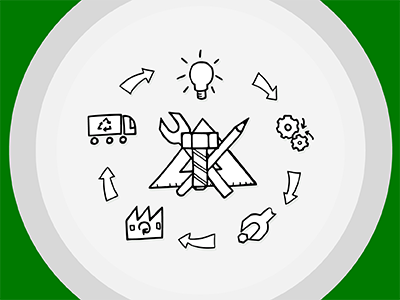Overview
Discover the latest developments in Design for Recycling (DfR) of electrical and electronic equipment (EEE) and how to design for circular plastics, metals and CRMs (critical raw materials).
Electronic products bring countless benefits to society, but their production and waste treatment also lead to numerous negative environmental and economic impacts. Since E-waste is the world’s fastest growing waste stream, governments are setting ambitious targets to help this industry transition towards a circular economy.
In a circular economy, products are designed to last. Yet every product will eventually reach the end of its functional life. Recycling can help recover the value embedded in its materials so that these can be used again to manufacture new products. However, – especially for complex products like electronics – applying this seemingly simple principle can raise big challenges.
This course supports designers, engineers and decision makers in the Electrical and Electronic Equipment (EEE) industry in making the transition towards a circular economy by exploring both Design for Recycling and Designing with Recycled plastics, metals and CRMs. Regardless of your level of design experience or your familiarity with the circular economy, this course will help you to either upskill or update your knowledge and improve your product design and materials selection.
You will learn how the recyclability of EEE products can be optimized through good design. The course will examine inspiring examples and provide insight into current and future recycling technologies, legislation and business models.
The course includes a virtual visit to a waste treatment facility and contributions from industry experts across the electronics supply chain showing the impact of design and material choices on the recycling and recovery process of the materials you use, and how concrete Design for Recycling guidelines help overcome these issues. The course also provides case studies to demonstrate how DfR can be applied to your own designs.
This course is an initiative from the Delft University of Technology, Partners for Innovation, Rijkswaterstaat and frontrunners within the EEE industry from the RE-CET (Redesigning Electronics in a Circular Economy Transition) consortium.
What You'll Learn
- Understand how value creation (product design) and value recovery (recycling) are interconnected.
- Recognize how different recycling technologies work and what their implications are for product design.
- Optimize the recyclability of electrical and electronic products.
- Apply recycled materials in new electronic products.
- Reduce risks and uncertainties when designing with recycled plastics.
- Understand the implications of future developments in design for recycling.
Details
Course Syllabus
Module 1: DfR at a systems level
- Introduction to design for recycling
- EEE in a circular economy
- Barriers and drivers for (design for) recycling
Module 2: DfR at the product level
- EEE recycling processes
- Shredding vs. dismantling
- Design guidelines for recycling of EEE
Module 3: DFR of Metals and Critical Raw Materials
- Metals and CRM in electronics
- Recovery of metals and CRM from WEEE
- DfR guidelines for metals and CRM in EEE
- Application of recycled metals and CRM
Module 4: DFR of Plastics
- Introduction to recycled plastics in EEE
- Applying recycled plastics in EEE
- DfR case study
- Assignment: applying recycled plastics
Module 5: Futureproof DfR
- Future developments in collection of WEEE
- Future developments in WEEE recycling processes
- Future developments in manufacturing with recycled materials
Qualifications
Chartered Engineering Competences
All our online courses and programs have been matched to the competences determined by KIVI’s Competence Structure, a common frame of reference for everyone, across all disciplines, levels and roles.
These competences apply to this course:
- A1: Extend your theoretical knowledge of new and advancing technologies.
- E3: Undertake engineering activities in a way that contributes to sustainable development and a circular economy.
Admission
This is a Massive Open Online Course (MOOC) that runs on EdX.
Prerequisites
Intended for product designers, engineers and decision makers in the electrical and electronic equipment industry and other professionals or students interested in design for recycling/designing with recycled plastics.


